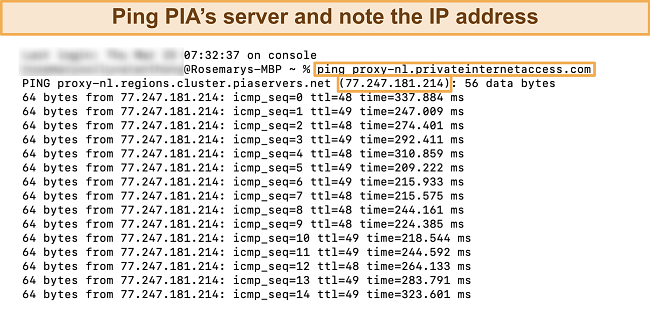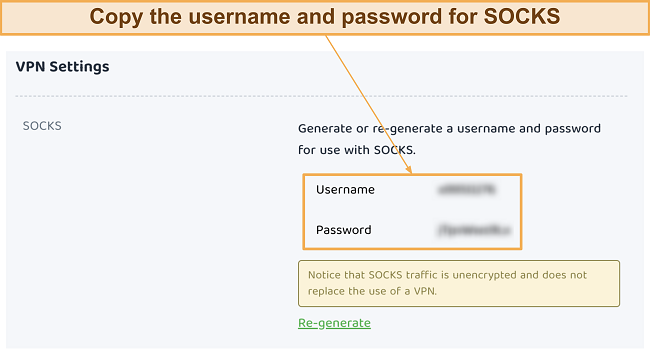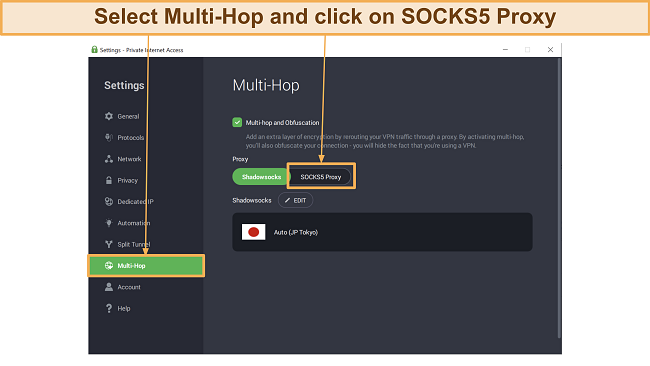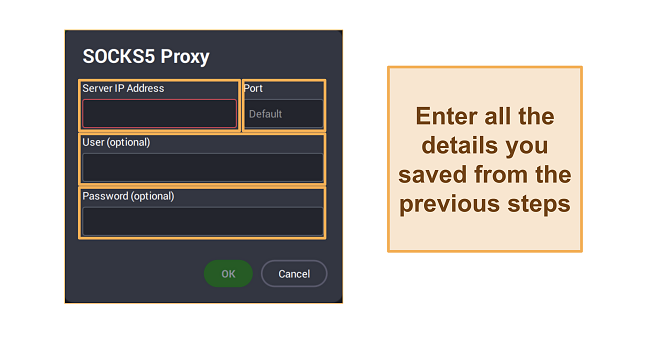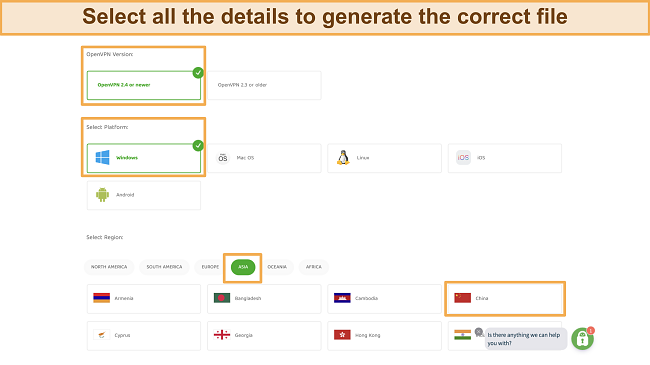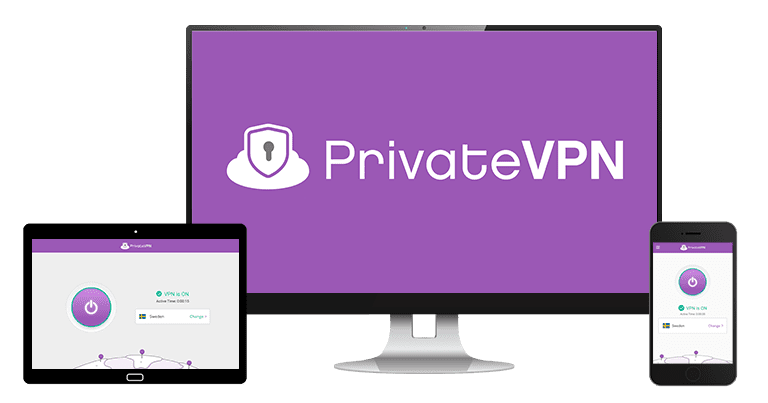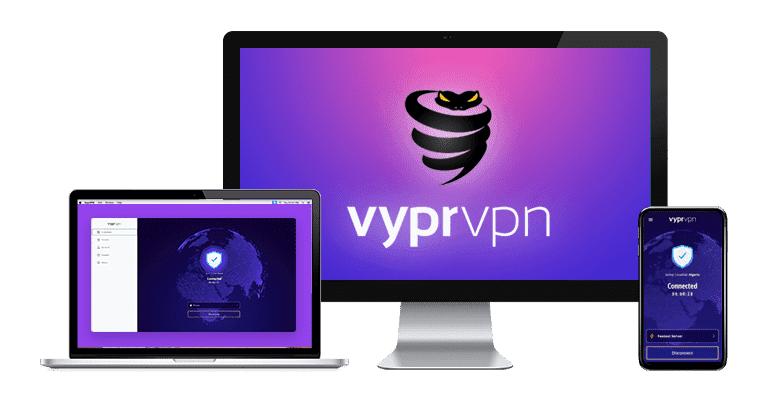How to Use PIA (Private Internet Access) in China: 2024 Guide
If you’re traveling to China, it’s risky to count on PIA to access all the online services and platforms you use regularly. Even if you try all the methods suggested by PIA, you could be wasting a lot of time with the technical details and still not have it work.
The Great Firewall of China makes it difficult for most VPNs to access the open internet freely. Since PIA’s customer support wouldn’t guarantee that I can use the app in China, I researched other providers that you can choose if you can’t get PIA to connect.
Of all the VPNs tested, ExpressVPN is the absolute best for China because it worked every time, was super-fast, and didn’t log my data. Your purchase is also risk-free when you get ExpressVPN for China because it’s backed by a 30-day money-back guarantee.
3 Easy Steps to Use PIA in China
- Download PIA. You’ll want to subscribe to PIA and install it before entering China, since it may not be possible to download the app once you’re already in the country.
- Connect to a server in or near China. The closer the server, the faster your speeds will be. Use the WireGuard protocol in the settings for the best chance of it working.
- Use PIA in China. If neither WireGuard nor OpenVPN works, it’s better to use a more reliable VPN for China instead, like ExpressVPN.
Does Private Internet Access Work Well in China?
No, PIA isn’t a reliable VPN for China, but that doesn’t mean that it won’t work at all. Here are the main considerations:
- PIA may be blocked by some Chinese ISPs, but not others
- your chances are better for bypassing the Great Firewall of China with mobile networks compared to standard broadband
- some PIA servers might work in China, but it could take a lot of tries to find them
If you do find a PIA server that connects, it won’t work for long since the Great Firewall of China constantly detects and blocks PIA’s traffic. You can use a special script for your device to try random PIA servers until it finds a working one, but this is a challenging technical process.
To get definite answers on if it will work in China, I contacted PIA via 24/7 live chat and a PIA agent confirmed that you might not be able to connect. Although the agent said that PIA is aware of the situation and their team is currently working to fix it, he couldn’t estimate when it will be resolved.
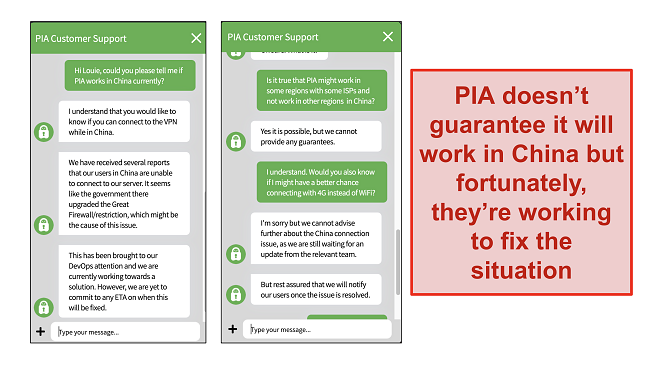
The PIA support page also confirms it’s difficult to connect to the service in restrictive countries like China.
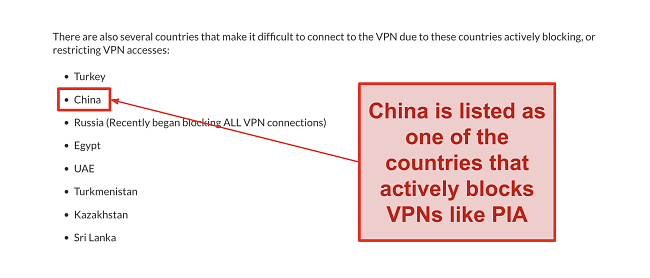
Because of these factors, my suggestion is to opt for a VPN like ExpressVPN that comes with a proven track record of functioning seamlessly in the country. This will spare you the hassle of dealing with manual setups and the frustration of experimenting with various servers, only to realize that you’re still unable to access the worldwide web.
However, you may not be able to access ExpressVPN’s regular site in China so install the app before you depart. Besides that, the apps work flawlessly in the country. But if you’ve already subscribed to PIA and you have no other options in China, try the following methods to use the internet without restrictions.
How to Set up PIA in China
1. Use SOCKS5 Proxy Connection
According to PIA support, using the SOCKS5 proxy on desktop is the most likely approach to work. To use PIA’s SOCKS5 proxy, you can refer to its online setup guides or follow these steps:
- Open the command prompt for Windows. If you use Mac or Linux, open the the terminal.
- Enter a command. Use proxy-nl.privateinternetaccess.com.
- Copy the IP address. You’ll need this later.
![Screenshot of using command to get PIA's proxy server IP address]()
- Log into your PIA account (not the app). This lets you generate a username and password specifically for SOCKS5. This is different from your login credentials for PIA.
- Select ‘Downloads’. You’ll need to copy some credentials in the next step, so make sure to save the IP address from earlier.
- Scroll down to the ‘VPN Settings’ section. Then copy the username and password.
![Screenshot of SOCKS username and password in PIA account]()
- Open your PIA app. Select ‘Multi-Hop’ from the panel. Click the SOCKS5 Proxy button.
![Screenshot of PIA app showing multi-hop panel]()
- A new window will pop up. Enter the IP address you saved previously and your login credentials for SOCKS. In the ‘port’ field, PIA recommends using port 1080.
![Screenshot of pop up window on PIA app to enter details to access SOCKS5 proxy server]()
- Click ‘OK’. Then try connecting to a server.
Since PIA’s website is blocked in China, do this before entering or else you won’t be able to log in to your account to get your SOCKS username and password.
2. Connect With the PIA Browser Extension
The customer support team recommends also trying the browser extension, as it often works better than the app in China. But you still have to subscribe to PIA to use it. Remember also that the Chrome, Edge, and Firefox apps are blocked in China. Luckily, you can download Google’s Chinese version of Chrome that works in the country.
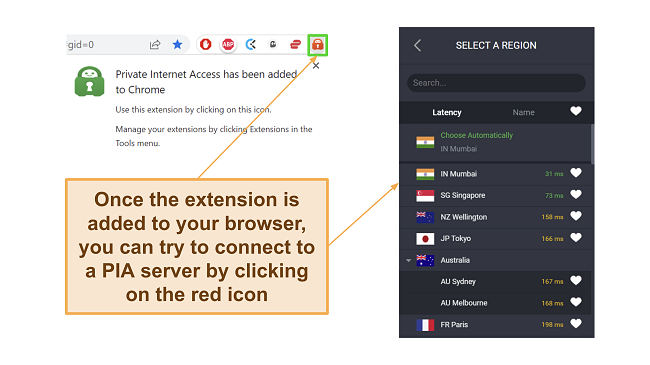
Remember that regardless of which browser you use, if you install PIA’s extension before you arrive in China, you’ll have a better chance of it working.
3. Try PIA’s WireGuard Protocol
You can also try getting the VPN to work in China with the WireGuard protocol. WireGuard is one of the safest and fastest protocols around and won’t compromise your speeds even if you choose a distant server. Plus, its smaller code base makes it easy to audit for improvements.
To change the protocol, open PIA and click the three dots in the quick settings section to view all options. Then select the Protocol tab in the options panel and choose WireGuard.
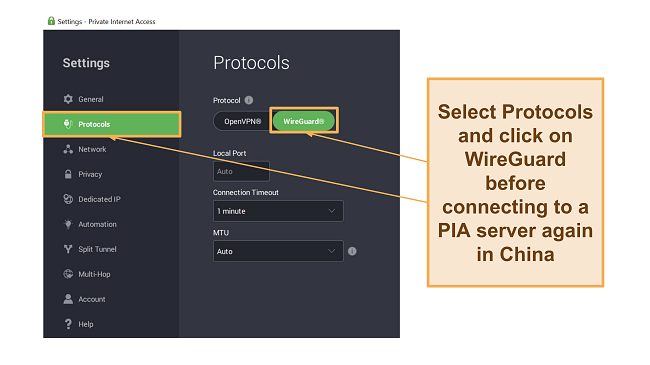
4. Switch to OpenVPN Protocol
If WireGuard doesn’t work, you can try switching back to PIA’s default OpenVPN protocol. OpenVPN is one of the most secure VPN tunnels available, so it’s perfect to protect your data from cyberspies and hackers in China.
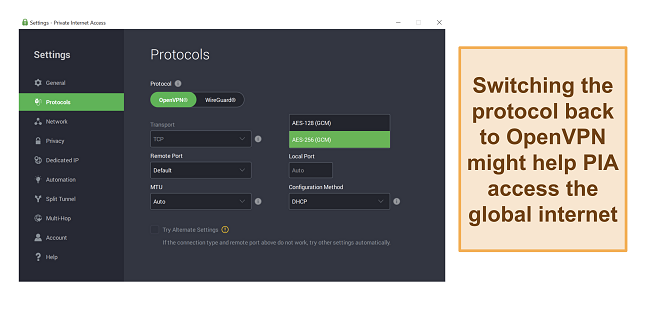
5. Connect With the OpenVPN Connect App
Sometimes, PIA’s built-in OpenVPN protocol doesn’t work in China. Fortunately, OpenVPN’s developers have created the OpenVPN Connect app to manually link the protocol to PIA. This open-source software sometimes works better for connecting within Chinese borders
First, you’ll have to download both the PIA and OpenVPN Connect apps to your device. On its website, PIA has detailed guides on how to configure OpenVPN Connect for Windows, Mac, iOS, and Android devices. The basic process is:
- Log into your PIA account in a web browser and click ‘Downloads’.
- Scroll to the bottom where it says ‘OpenVPN Configuration Generator’.
- Click on the ‘Go to OpenVPN Generator’ link.
- Select your OpenVPN Connect version, operating system, country (China), and port. PIA’s support team couldn’t recommend the best port so unfortunately, you’ll have to try all 8 until you find one that works.
![Screenshot of PIA's app showing OpenVPN Connect generator page]()
- Check the ‘Use IP’ box and hit ‘Generate’.
- Select ‘Download’ in the pop-up window.
- Depending on your device, follow the instructions to import the downloaded file to the OpenVPN Connect app.
- Connect the imported file and try using PIA.
If it still doesn’t work, your last resort is to use a VPN that’s proven to give unrestricted access to the internet in China like ExpressVPN.
Best PIA Alternatives for China in 2024
1. ExpressVPN – #1 VPN for China to Unblock Any Site With Unmatched Speeds and Privacy Features
Key Features:
- 3,000 + servers in 105 countries like Hong Kong, Japan, and Macau
- Military-grade 256-bit encryption, a kill switch, and audited TrustedServer technology
- 24/7 live chat, email support, and helpful video tutorials
- Use the internet without restrictions on up to 8 devices at the same time
- 30-day money-back guarantee you can trust
ExpressVPN is the overall best VPN for China and outranks its competitors in speed, security, and the ability to bypass The Great Firewall of China. Unlike PIA and others, ExpressVPN’s networks are fine-tuned for China so you can connect to a server without configuring anything manually and access the open web right away.
If you use the default settings, ExpressVPN will automatically use the correct protocol in China to hide the fact that you’re using a VPN. I was impressed by ExpressVPN’s huge network, which is useful when you’re traveling in China and need to unblock content from your home country. Also, since all ExpressVPN’s 3,000 + servers are obfuscated, they reliably access:
| Netflix US | Hulu | HBO Max |
| Disney+ | Amazon Prime Video | YouTube TV |
| Crunchyroll | ESPN | Sling TV |
| BBC iPlayer | ITV | 10 play |
| DAZN | RaiPlay | Zattoo |
I wondered about ExpressVPN’s speed because obfuscation usually slows down servers, especially when your data has to travel further. Surprisingly, the networks in the US almost 10,000 miles away from me were super-fast. There were no lags so I didn’t feel like I was using a VPN while watching Mike Dane’s 4.5 hour-long python course on YouTube. I got similar results on other servers around the world.
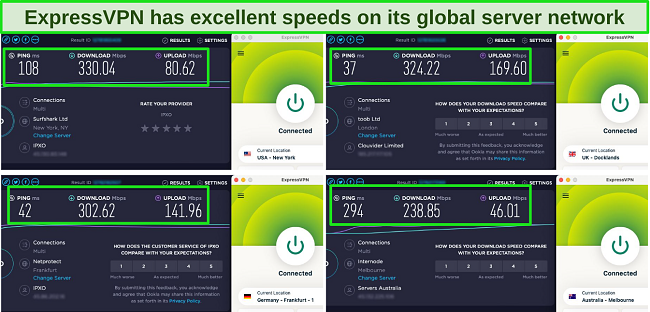
Since ExpressVPN doesn’t have servers within China, it doesn’t have to comply with any internet surveillance regulations. Plus, ExpressVPN uses TrustedServer technology to guarantee your data isn’t recorded. The RAM-based servers don’t write your data to a hard drive to eliminate risks like spying, thefts, and leaks. ExpressVPN also has:
- Military-grade encryption – secures your connection against hackers and spies with the strongest cipher available.
- Network Lock – disables the internet when your computer goes to sleep to prevent data leaks.
- Internally-hosted DNS servers – avoids using a Chinese ISP’s DNS, which hides your connection and keeps you anonymous from third parties.
- IPv6 leak protection – prevents your IPv6 address from being detected by the Great Firewall of China.
- British Virgin Islands jurisdiction – has privacy-friendly laws that doesn’t require the VPN to save any of your online activities or data.
- Anonymous subscription – accepts Bitcoin so you don’t have to share any personal details with the VPN.
If you need to update the app or speak to a support agent from China, use the Tor browser at http://expressobutiolem.onion or use its mirror site. To avoid getting the mirror site blocked, I recommend contacting ExpressVPN on 24/7 live chat to get the link. The agent asked me for my email address and I got the link in less than 2 minutes.
Though it’s great that ExpressVPN accepts Bitcoin, you can’t subscribe to the VPN for China using Amazon Pay or Google Pay. But since ExpressVPN has many other payment options including UnionPay, iDEAL, giropay, PayPal, and more, it isn’t an issue.
For the best deal, get ExpressVPN’s 1-year + 3 months plan. It’s $6.67 per month and is completely risk-free. You’ll have 30 days after purchasing to decide if it works as you expected in China. If not, it’s easy to get a refund. I just sent a message on live chat and received a confirmation within 2 minutes. 4 days later, I got my money back.
ExpressVPN works with: Windows, Mac, Linux, Android, iOS, Chrome, Firefox, Amazon Fire TV, Fire TV Stick, Apple TV, gaming consoles, routers, and more.
2024 Update! ExpressVPN has dropped prices for a limited time to a crazy $6.67 per month for the 1-year plan + 3 months free (you can save up to 49%)! This is a limited offer so be sure to grab it now before it's gone. See more information on this offer here.
2. PrivateVPN – Stealth Mode Sneaks Your Traffic Past the Great Firewall of China
Key Features:
- 200 + servers in 63 countries including Hong Kong and Taiwan
- Military-grade 256-bit encryption, no-logs policy, Stealth Mode, dedicated IP servers, and a kill switch
- Help available via 24/7 live chat, email, and online guides
- Get unrestricted internet access on 10 devices in China
- Reliable 30-day money-back guarantee
PrivateVPN uses Stealth Mode to get your traffic past Chinese blocks and access content from back home. Though the Great Firewall of China monitors VPN connections, it doesn’t detect PrivateVPN’s since your data is disguised as regular traffic. Turn on the feature to use PrivateVPN safely in China and connect to a nearby server like in Hong Kong.
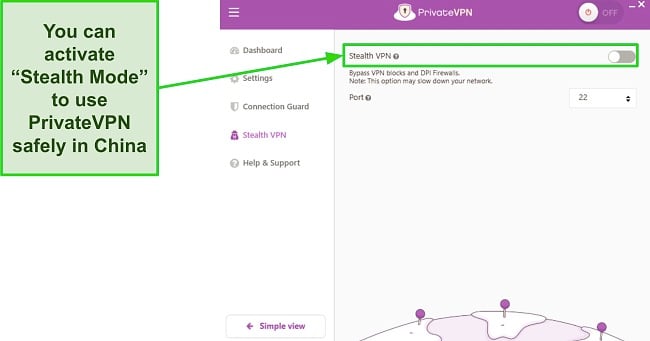
Thanks to this obfuscation feature, PrivateVPN instantly unblocks apps in China. In addition to apps like Reddit, Instagram, LinkedIn, Discord, and others, PrivateVPN can also bypass the geo-blocks on Netflix US and several other popular streaming services like:
| Netflix US | Hulu | HBO Max |
| Amazon Prime Video | Disney+ | YouTube TV |
| 10 play | DAZN | BBC iPlayer |
| RTE Player | Crunchyroll | Paramount+ |
Since your privacy and security are equally important when using the internet in China, PrivateVPN has some of the best features to keep you anonymous online. Some of these include:
- Military-grade encryption – wraps your traffic in a secure blanket to make it invisible even with advanced hacking technology.
- Dedicated IP servers – these servers are less likely to be blacklisted in China and include locations in the US, UK, Germany, and a few other countries.
- IPv6 leak protection – makes sure your real IP address is never exposed when accessing your usual platforms from home in China.
- Strict no-log policy – doesn’t collect or store your data when you’re using its servers in China.
If it’s your first time using a VPN in China, PrivateVPN’s support team can set up the VPN for you remotely. Download the TeamViewer app, contact PrivateVPN via live chat, and they’ll tell you what to do. If you’d rather do it yourself, installing PrivateVPN for Windows only took me 2 minutes. But download the apps before departing as PrivateVPN’s website is blocked in China.
Though PrivateVPN’s obfuscation feature is great at getting past web filters, it slowed down my connection by 16% during tests. On my WiFi it caused short Instagram clips from Chinese influencer Chelsea Kwok to buffer. If you don’t have a high-speed connection in China, I recommend using ExpressVPN since it’s faster.
If you’re on a budget and just need something affordable short-term for China, PrivateVPN is one of the best monthly VPNs. To pay even less. PrivateVPN’s 3-year plan is the most economical option on this list, costing just $2.00 monthly.
You’ll also have 30 days to think your purchase through since all subscriptions have a money-back guarantee. When I sent an email asking for a refund, I got a reply the same day. 10 days later, my money was back in my account.
PrivateVPN works with: Windows, Mac, Linux, Android, iOS, Chrome, Firefox, Fire TV Stick, gaming consoles, routers, and more.
2024 Update! PrivateVPN has dropped prices for a limited time to a crazy $2.00 per month with the 3-year plan (you can save up to 85%)! This is a limited offer so be sure to grab it now before it’s gone. See more information on this offer here.
3. VyprVPN – Chameleon Technology Hides VPN Traffic From China’s Deep Packet Inspection
Key Features:
- 700 + servers in 63 countries including Hong Kong
- Military-grade 256-bit encryption, Chameleon protocol, privacy-friendly jurisdiction with internally-owned servers to prevent security abuses, plus a kill switch
- 24/7 live chat and email support plus helpful setup guides
- Access global content from 10 devices at once in China
- 30-day money-back guarantee
VyprVPN’s Chameleon protocol mixes up your connection data until the Chinese firewall’s deep packet inspection can’t recognize it as VPN traffic. It combines this technique with Smart IP, which changes your IP address frequently to make detection even more difficult. Meanwhile, these other features help you use the open internet safely in the country:
- Public WiFi protection – connects the VPN automatically when you use an unrecognized WiFi network to keep your devices safe in China.
- IP Leak protection – makes sure your information travels through the encrypted tunnel in China as long as you’re connected to ExpressVPN’s server.
- Split tunneling – lets you route only traffic from certain apps to go through the VPN while others bypass letting you seamlessly access both Chinese and global sites seamlessly.
Since VyprVPN has servers close to China in Hong Kong and Macau, they’ll give you the fastest connections for high-bandwidth activities. I averaged 58Mbps on a Hong Kong server just 1,500 miles from my location for a Skype session with friends. The call never dropped and had clear audio and video quality throughout.
Besides keeping China visitors up to date with news sites like Reuters, The Guardian, and The Washington Post in China, VyprVPN can also unblock many streaming platforms. Tests showed that you’ll be able to access your accounts on:
| Netflix US | Hulu | HBO Max |
| Amazon Prime Video | Disney+ | Crunchyroll |
| DAZN | ESPN | BBC iPlayer |
If you’re already in the country, VyprVPN has a mirror site that works in China. You can download its apps and connect up to 10 devices at once. When I used all the connections simultaneously, I didn’t face any performance issues with the VPN connection or apps.
The only minor flaw is that VyprVPN doesn’t accept cryptocurrencies so you have to reveal your payment details when you subscribe. But I wasn’t concerned when I subscribed because VyprVPN is based in Switzerland, which has VPN-friendly privacy regulations. Plus, VyprVPN has been independently audited to verify it keeps no information that can personally identify me.
If you’re ready to get VyprVPN for China, the 2-year plan is just $3.00 per month. It comes with a 30-day money-back guarantee so that you can try it confidently. If you don’t like it, just contact support through the 24/7 live chat. When I asked for a refund, VyprVPN processed it immediately and I got my money back in 10 days.
VyprVPN works with: Windows, Mac, Android, iOS, Chrome, gaming consoles, routers, and more.
FAQs on Using PIA VPN in China
Is using PIA in China legal?
No, only VPN services approved by the Chinese government are legal in China and they monitor your activities. PIA doesn’t work well in China because the government has banned all other VPNs and set up the Great Firewall of China to block VPN traffic. As a result, most VPNs and their respective websites don’t work in the country.
However, some services do work there, and many tourists use VPNs to keep in touch with friends and family using their regular messaging apps. There haven’t been reports of a foreigner being arrested or fined for using a VPN in China. That said, I don’t condone using a non-approved VPN in China and you should understand the risks before connecting.
What is the best VPN for China?
You can use any of the VPNs on this list but ExpressVPN is the best VPN for China with high scores in all 3 of the most important areas – bypassing the Great Firewall of China, high-speed connections, and top-notch privacy.
Unlike PIA, you won’t have to configure the ExpressVPN app manually to get it to work in the country. Plus it has a mirror site that you can access from China if you didn’t get to download the app before arriving.
Can PIA unblock Chinese content?
Yes, because PIA has a server in China. Follow the 3 steps to connect to PIA in China to access Chinese content in other parts of the world. Some of the platforms it managed to unblock are Baidu, IQiyi, CCTV, Tencent Video, and BiliBili.
However, I recommend ExpressVPN because its servers in Macau, Taiwan, and Hong Kong work with Chinese video platforms like iQIYI. It’s also one of the best VPNs with super-fast speeds to load TV shows and websites quickly.
What apps are blocked by the Great Firewall of China?
All the top alternative VPNs for PIA in China can access many apps including:
| Netflix (multiple libraries) | YouTube | |
| The Guardian | ||
| Wikipedia | Twitch | |
| Quora | Dropbox | SoundCloud |
| Medium | Discord | The Wall Street Journal |
| Skype | Spotify | Hulu |
Why does the Great Firewall of China exist?
The Great Firewall of China is a set of technologies used to control and manage the information consumed in China. Though the top VPNs for China can bypass this firewall, most are blocked so that the government can maintain:
- Political control – suppresses views that oppose the government or communism by not allowing them to spread online.
- Social stability – curbs alternative thinking to prevent social unrest.
- National security – manages false information that could threaten national security.
- Economic preservation – protects local industries from outside competition by limiting access to foreign products and services.
What should I look for when choosing a VPN for China?
Look for VPNs with obfuscated servers to access global content and platforms. Not all VPNs with this feature are powerful enough, but a top provider like ExpressVPN meets all the criteria of an excellent VPN for China:
- top speeds to support high-bandwidth activities like streaming
- a mirror site that works in China to contact support in an emergency
- an automatic kill switch, IP address leak protection, and a no-log policy
- servers near China like in Hong Kong, South Korea, and Japan
- anonymous cryptocurrency payment method
- a money-back guarantee you can rely on
Can I use a free VPN while I’m in China?
Yes, but they’re not safe so I don’t recommend them. Even the best free VPNs like Hide.me have several limitations that don’t make them a good long-term solution. Your devices will be secured by military-grade encryption, a kill switch, and IP leak protection in China, but you can only choose from 5 server locations and use 10GB a month.
If your home country isn’t on the free server list, you won’t be able to access all the services you’re used to. That’s why it’s better to get a premium VPN like ExpressVPN for China that’s guaranteed to work and backed by a 30-day money-back guarantee. If you’re not happy, just ask for a refund.
Final Thoughts on Using PIA in China
There are a few tricks that might allow you to use PIA in China to access your regular accounts, but they’re not guaranteed to work. If you find a server that connects, you’ll likely have to look for another one a few days later to avoid China’s firewalls. The best way to avoid all the hassle and just enjoy your time in China is to get a reliable VPN.
Based on the test results from dozens of VPNs, ExpressVPN is the clear winner for China. Besides being proven to work in the country, it’s fast and protects your right to privacy so that no one can watch what you’re doing. Plus, if you get ExpressVPN for China it won’t be a risky buy because you’ll have 30 days to ask for a refund if you don’t like it.

